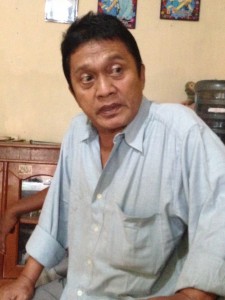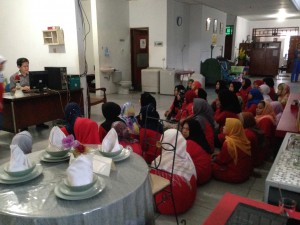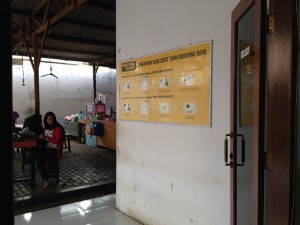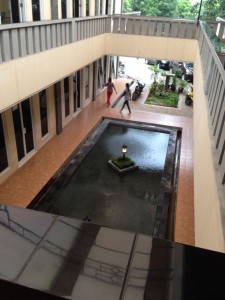Stories of Origin is a new MR series of articles and interviews that explores the lived experiences of both returning and potential migrants and their families. In the second and concluding part on Indonesia, we speak of the poor training and orientation that female domestic workers receive.
In an increasingly unfavourable migration environment, families in rural Indonesia have to be lured into sending their young women to the Middle East. Thousands of unregistered sub-agents scout villages for vulnerable and willing families. These sub-agents or field officers work under the radar, while chalos (like Omo, whom we met in our previous story) are registered with the government.
Following interviews with families and returning migrants, we stop for tea at the home of Dadang Muchtar, the chairperson of Karawang Migrant Workers’ Solidarity Center. He has gathered a group of ‘field officers’ (sub agents), returning migrants (including Sadiya), and families of migrants. His home is in the Paserkaliki village in the Karawang district.
The ban that isn’t
While the group is well-aware of the risks migrants face, they don’t agree with the moratoriums and bans the Indonesian government places. “This just puts them (migrants) at greater risk. And how do you provide employment to all these people, if you don’t allow them to seek opportunities abroad?”
Dadang has never worked abroad, but many of his family members do, including his sister. He speaks favourably of migration, and works with the community on safe migration. “Lives can change when people go abroad and work. There’s not much job opportunities in Karawang. Local industries and agriculture doesn’t pay much.”
It’s not government policies alone that inhibit migration now. “People now want to go for vocational training. They are looking at self-development. Which is good. But ultimately, when they want to start their own business or buy land, they have no choice (but to migrate).”
He deduces that despite the ban on new migration to Saudi, many go via Oman or Abu Dhabi. Wadi, who is part of the assembled group, says his wife is in a training center, getting ready to go to Qatar.
“There’s a ban. How will she go?”
“She has a visa for another Arab country too. But she will work in Qatar.”
“Who told you?”
“The chalo. And the training center.”
Marna, a sub-agent, chips in. “The numbers have reduced, but people still go. There’s no real ban.”
His work covers 14 villages in Karawang, and he deploys workers to various agencies, getting Rupiah 4 million (about US$300) per worker. “I keep 1.2 million for myself. Rest to the family.”
The chalo and the sub-agents are the ones held accountable by the community and the first person to be ‘punished’ when something goes wrong.
“Do you receive complaints from workers in the Middle East?”
“Yes, mainly about salary. And I tell the (manpower) agency. But we get little help.”
[tweetable]Once a domestic worker leaves Indonesia, the responsibility is scattered across various governmental and private agencies across both countries, and no one is held accountable when there’s a problem.[/tweetable]Dadang recalls the case of the Indonesian maid, Nani Suryani, who was murdered in January 2011 by her ‘madam.’ “We didn’t get the body till February 2012. And the family received no blood money. The governments’ response on both sides was inconsistent.”
Still women go under duress. “Families compel them to go. To pay off existing debts. To build homes or businesses. Then it gets worse. Many men end up marrying again when the wife is away. They continue to receive and use the remittance. And they have also received that signing fee.”
The chalos receive about Rupiah 10 million per worker ($750) from the recruitment agency. They keep half of this, and distribute the rest between sub-agents and the families of potential migrant workers. With that, the family is held in a sort of bondage. The young woman is shipped off to Jakarta, to one of the training centers.
40 days of non-training
The training centers are all in Jakarta. From Indonesia, there are two main routes of labour migration. One to the Asia Pacific and the other to the Middle East.
The profile of domestic workers (maids) going these two different routes is a study in contrasts. So is the nature of training.
We visit a couple of training centers. One stuck in a time warp, with twilight lighting and in-your-face Western Union posters. The other is all marble and water fountain, and seems like a students hostel, except for the high ‘prison’ gates.
As we drive out of a large bungalow, a van full of potential workers are brought in. They enter the place that will host them for six to seven weeks of training and paperwork before they are deemed fit to be shipped off to countries in the Gulf.
This new vanload of young women will join the 100 others inside who are at different stages of training. They will surrender their mobile phones, and not have any contact with the outside world during the training period. And on every wall is a Western Union sponsored poster. But that’s a story for a different day (Indonesia receives $8.4 billion as remittances annually).
This center deals exclusively with recruitment to the GCC. The manager, Pheri, insisted that none were going to Qatar or Saudi, and that the majority were headed to Abu Dhabi and Oman.
At the time of the visit, Indonesia had placed a ban on workers going to Saudi Arabia and Qatar alone. It has since extended it to 17 countries, including all GCC states. However, this doesn’t deter workers from coming to the Gulf through illegal routes.
Pheri says there are two kinds of workers that they train. Formal – cleanings services, hospitality; and domestic workers – maids, nannies, cooks.
The latter train for 40 days, 10 hours a day. All their paperwork, from passports to visas to medical, is the responsibility of his agency. The chalos in the village only scout for potential workers, the rest is taken care of by the training center.
The domestic workers are not trained in a particular skill. “We just push them towards what they are good at,” he says.
However, employers in the receiving countries are looking for and are promised (by local recruitment agencies) workers with specific skills. Quite clearly there is many a slip between cup and lip. With regular prayer breaks, the trainees go through the motions of pushing prams and setting tables for hours on end. They look bored.
The bungalow that houses the training center is decorated on the lines of an imagined Arab home. Faded and worn out furniture, that probably was considered luxury in the distant past, are neatly arranged. There’s the bedroom with a dressing table; a nursery with a pram, toys and changing table; sitting staidly in the middle of this chaos is a dining table set for a 4-course meal; a laundry area; and a kitchen with museum pieces of appliances. Then there’s a majlis with a sheesha as a centerpiece. Yes, they will be training to set-up and ready a sheesha too.
Beyond the ‘Arab’ home set-up, is the backyard turned into a dining area for the ladies. A few trainees on the benches, exchange a whispered words and look into what appears as a surreal preview of the life that awaits them a few thousand miles away.
The trainer knows this is not ideal.
“This is the government prescribed training material, we know none of this will be there in the Gulf and everything is new. When they go there everything will be different,” says the trainer.
Pheri says learning Arabic is compulsory and 80 percent of the returnees (those who have worked in the GCC earlier) speak it well. All the trainees are muslims and are in hijab, in the age group of 21 to 38 years. Formal workers are in the 18-30 age group. These are the boxes that they are ticking off to make their trainees appealing to potential employers.
Reluctant recruits
On the first floor of the bungalow is a large hallway where prayers are held and sermons given. Lining the hallway are the dorms. On the grilled stairwell sit a group of women looking down into the drawing room where we are seated. The air is thick with what I could only describe as tension. It could just as well be mugginess, given the overcrowding and humidity.
We manage hurried conversations with a few of them before the designated interviewees meet us. The informal chats reveal that many are still going to the countries Indonesia has placed a ban on.
Officially, new migration to Saudi has been banned since 2011, and to Qatar since 2014.
Migration to Abu Dhabi and Oman have been on the rise though, and the agents use that as a transit point, before sending them to Saudi or Qatar. The checkpoints are only at the Jakarta departure terminal. Once clear of that, these bans hold no meaning.
[tweetable]A community worker says the trade in passports is quite high too. The ban doesn’t apply for returning migrants.[/tweetable] So once you return after your stint, you could pledge your passport for a commission, and someone else would travel on that.
The players in the chain of exploitative migration are many, with the worker herself having little or no say.
As a first step, the family of the worker needs to give permission, and the village head has to give a letter. The willingness of the worker herself is assumed, and never questioned. Once training is completed, four stakeholders sign the employment contract: the Indonesian Embassy, the Bureau of Migrant Workers, the Director of the agency in Indonesia and the Director of the agency in receiving country. There are two other contracts: between the agencies in Indonesia and in the Gulf; and between the employer and agency in the Gulf country. Again, the employee’s acceptance is implied. Not explicit.
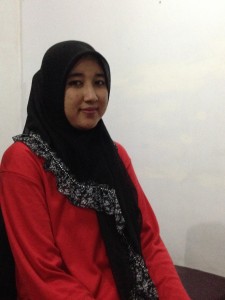
Ratnawati knows little about Bahrain or the Gulf. She is resigned to being separated from her 4-year-old daughter for the next three years.
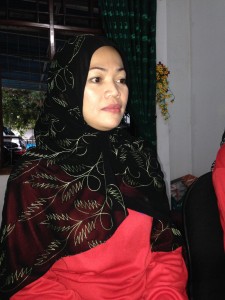
Lisnawati is remigrating, this time to support her husband's business. She knows life will be tough, but is willing to make the sacrifice.
The trainer brings in two trainees. The older of the two, Lisnawati (38) worked in Dammam, Saudi between 2006 and 2009. She is the one who speaks ‘fluent’ Arabic. I quiz her, and her pidgin Arabic makes me sound like a scholar. “I don’t remember anything,” she giggles.
Her 3-year stint with a family of 16 (including 12 children) helped her build a home for her family.
“They were good. I woke up at 4 a.m. to prepare breakfast. Once they left to work and school I could sleep a little again. Then I worked again from 9 a.m. to 11 p.m. When the children were home they helped me, because I was the only maid.”
She sent back home all of the 800 riyals they paid her monthly. “I was allowed to use their phone to call home and they took care of my other needs. And I didn’t need much. I didn’t have an off day and went out with them. Even to Hajj. So I didn’t need money.”
Six years after her return, she prepares to go back. This time to support her husband’s business dream. “He is a driver still, and wants to run his own taxi company.”
The six million rupiah the agency paid her to go to Saudi has already been spent.
Twenty two-year-old Ratnawati is more reticent. She is leaving behind her 4-year-old son to go to Bahrain and earn money to build a home. She doesn’t know where Bahrain is. “The returnees have given me some dos and don’ts. Yes, I am scared, but what to do? I have to build a house.”
“Do you know who your employer is?”
“No. How?” She looks perplexed.
A small number of them do Skype with potential employers. The rest of them enter employment and migration blindly. To Pheri, that’s normal.
“What if there’s a problem when they land?”
“They contact the agency here or there. Main complaint is salary. They are promised Omani Riyal 120 or Qatari Riyal 1200 and don’t receive it there.”
“What about the isolation they face. Do you give them phone numbers or contact of other maids whom you have placed in those countries?”
“No. Why should we? That’s dangerous.”
He doesn’t explain why it’s dangerous.
Asia Pacific, ahoy!
The next training center we enter is large and airy. But for the large, double-layered prison-like gates, one could easily mistake this center for a students’ hostel. A good one at that. The training center itself is a modern building with a central courtyard and a fountain.
The financial burden of migrant recruitment almost entirely is borne by the employer, in the case of the GCC. Asia Pacific migration places the burden on the workers. However, the workers are paid much more, are more empowered, and have more freedom in those countries. [tweetable]Each group chooses the sacrifices and compromises they are willing to make.[/tweetable]
Asramaputri has worked as a trainer for over a decade, and has trained thousands of workers headed to the Middle East and Asia Pacific.
“These are two distinct profiles. To the Middle East they go mainly as helpers. The madam is home most of the time, so the maid just helps. To Asia Pacific they have to be more independent. Employers are never home, and often it’s for elderly or child care.”
Accordingly, the training differs. So does the tone of training. “We have to motivate the workers to go to the Middle East. Keep giving them hope. Because they anticipate more trouble. Whereas, for Asia Pacific, we just have to talk to them about financial literacy and all that. They are already motivated. They have freedom there, and they get paid more.”
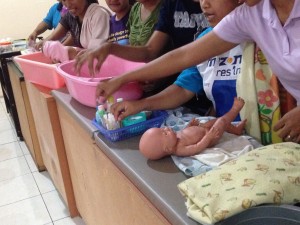
From changing diapers to handling wheelchair dependents, the training center for Asia Pacific migration has a lot more glitz to it.
Monthly salaries can go up to US$3000 in Taiwan and Hong Kong, especially for elderly care. They also pay a hefty recruitment fees. Up to 50% of the monthly salary is deducted at source by the employer to pay the agent.
Niken, who works for the Shelter Me project, surveys domestic workers at the airport, pre-departure. She notices a similar trend. “The ones going to the Middle East are not aware and look scared. Especially the new migrants. They cling to the one or two returnees in the group. However, those going to Asia Pacific are well-spoken and seem more empowered. It’s very stark.”
Since there is no ban on formal workers, many domestic workers go on that visa, and end up working in private households, she says.
With governments of employment and origin refusing to talk or co-operate with each other, there is enough scope for blurry avenues of employment. Countries in the GCC are under no mandate to recognise Indonesia’s ban. They then absolve themselves of all responsibility for how the worker was recruited.
As Indonesia insists there’s a ban in place, it sees little or no need to build resources in its mission to deal with problems that might arise. In a situation that is lose-lose, each party maintains that they have done their best to protect migrant workers.
